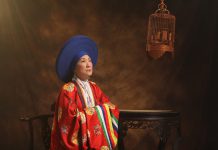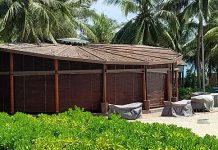Three banh canh eateries in Saigon are creating a splash among hundreds of ordinary noodle shops in the city thanks to their cut-above style, service, and ingredients.
Resembling the Japanese udon noodle, banh canh, literally translated as “cake soup”, is either made with pure rice flour or rice flour mixed with tapioca, giving it a thick appearance and chewy texture. Typical topping options include pork, chicken, and seafood.
“Giant” crab banh canh in District 5
 |
A pot of banh canh at Ba Ba comes with a ladle so customers can split the soup into smaller bowls for individual servings. Photo by VnExpress/Cao Ly. |
Ba Ba (Madam Ba) eatery in Alley 84 on Nguyen Bieu Street in District 5 is known for serving their crab noodle soup banh canh in large ceramic cooking pots suitable for two to three people.
Aside from the big serving, the banh canh at Ba Ba lures patrons with its viscous orange broth enriched with crab meat, pork bones, and dried shrimp. Cashew oil and tapioca starch are added to achieve the color and viscosity.
Toppings consist of two to three slices of shrimp and fish cake, quail eggs, blood pudding, and pig skin. A portion costs VND92,000 ($4). The eatery opens from 9 a.m. until 8 p.m.
Phu Yen garlic chive banh canh in District 10
 |
Customers can request to have less chives in their bowl. Photo by VnExpress/Cao Ly. |
A specialty of central Phu Yen Province, a bowl of banh canh covered in garlic chives at 111 Cao Thang Street in District 10 might turn some away because of its strong smell. However, garlic chives are tactfully used here to dilute the fishy flavor of the soup.
In central Vietnam cuisine, the broth for soups is usually made with seafood for a sweeter taste than regular pork bone varieties. Simple yet delicious, toppings include thick cut noodles, fish cakes, a piece of mackerel accompanied by a sweet and sour sauce on the side.
A bowl costs VND40,000 ($1.7) and VND50,000 with mackerel. The eatery also serves other Phu Yen delicacies like chicken rice, basil chicken hotpot, and tuna salad. The restaurant opens from 7 a.m. until 9.30 p.m.
“Two bowl” banh canh in District 1
 |
A portion includes a bowl containing the noodle soup and another with the meat, giving the eatery its “two bowl” nickname. Photo by VnExpress/Cao Ly. |
Every noon, the eatery at 10 Pho Duc Chinh Street in District 1 teems with customers. Even though the sign only advertises squid porridge, the joint attracts customers for its delicious rendition of banh canh.
Each serving features two bowls, one containing the soup and noodles, the other, meat. A lime, pepper, and salt dip is served on the side. Here, the soup is topped with a chicken drumstick, wing, or pig’s trotters.
Recipe for making porridge is also used for the soup and sweetened with shreds of dried octopus, pork bones, and dried shrimp.
The eatery opens from 7 a.m. until 9 p.m. Aside from porridge and banh canh, it also offers Vietnamese macaroni (nui), wonton, and side dishes like century egg and boiled chicken feet.
The price for a bowl ranges from VND50,000 to VND55,000, depending on additional extras.

































